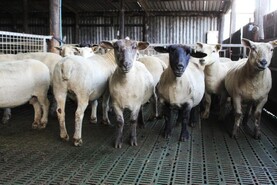Straw requirements
The prospects for straw supplies are better than first anticipated, with ideal conditions for harvesting winter crops and an upturn in weather coinciding with harvesting spring crops helping to compensate for a significant acreage entered in the Straw Incorporation Measure scheme.
It is worth farmers getting required supplies on hand early in the season. Lowland ewes will require 7kg straw bedding per week to absorb all urine, while hill ewes have a lower requirement of 4kg to 5kg. As a rule of thumb, one 4x4 round bale weighing 140kg will be sufficient to bed 18 to 20 lowland ewes per week or 30 to 35 hill ewes.
This requirement is generally for ewes fed silage and the requirement may be reduced by 20% to 30% for ewes fed hay or high dry matter haylage. Applying straw with a straw blower will also reduce the level of usage.
It is important to also count in the requirement for lambing pens, with about four to five bales required for every 100 ewes in a system targeting a 24- to-36 hour turnaround period.
Sheep welfare scheme tasks
A number of measures in the Sheep Welfare Scheme are due to conclude in the coming weeks. As part of the flystrike control option, at least two dag scores must be carried out from 1 June to 30 September, with the results recorded in the scheme action book.
The parasite control option requires lowland flocks who selected this measure to carry out two faecal egg counts before 30 September, while hill flocks who opted for this measure must carry out one faecal egg count post-weaning.
Mineral supplementation of ewes post-breeding is the second most common measure selected by farmers after pregnancy scanning.
The measure requires ewes to be supplemented for 60 days after breeding, with the start of breeding taken as the day ewes are joined to rams.
Farmers can decide on the product which best suits their system, with the most common options being administering a mineral drench, bolus or offering lick buckets. A combination of products can also be used as long as the 60-day period is covered.
The supplementation period can also start in advance of breeding and, remember, products selected must specify the dosage rate and the length of cover provided. Ensure also that invoices for purchased products coincide with breeding timelines.
Sheep Ireland ram sale
The catalogue for the Sheep Ireland elite €uro-Star multi-breed ram sale can be found at www.sheep.ie. The sale, which takes place on Saturday 28 August in Cillin Hill Mart, Kilkenny, at 11.30am, is Ireland’s largest catalogued ram sale, with 412 rams entered.
The sale offers rams from 10 different breeds. The largest entry at present is Texel rams, with 150 entered in the provisional catalogue. This is followed closely by Charollais with 130 rams, while Suffolk are next up with 57 rams. There are 33 Belclare rams, 16 Vendéen, nine of each Hampshire Down and Lleyn, eight Rouge de l’Ouest, three Border Leicester and one Beltex.
Sheep Ireland explains that every ram in the sale is DNA-verified to its sire, while each ram is also in the top 20% of the breed based on a genetic evaluation. Online bidding is via the MartBids sales platform.






 This is a subscriber-only article
This is a subscriber-only article










SHARING OPTIONS: